
野生咨询|内容教练|🎙空无一物/有效失败 亲密关系|多元思维|认知升级|成人教育 DAO/Crypto|🌍 世界公民 B站/公众号:范米索| 微博:斜杠少女范米索
Vol.2 Why does patriotism become a shackle? understand nationalism
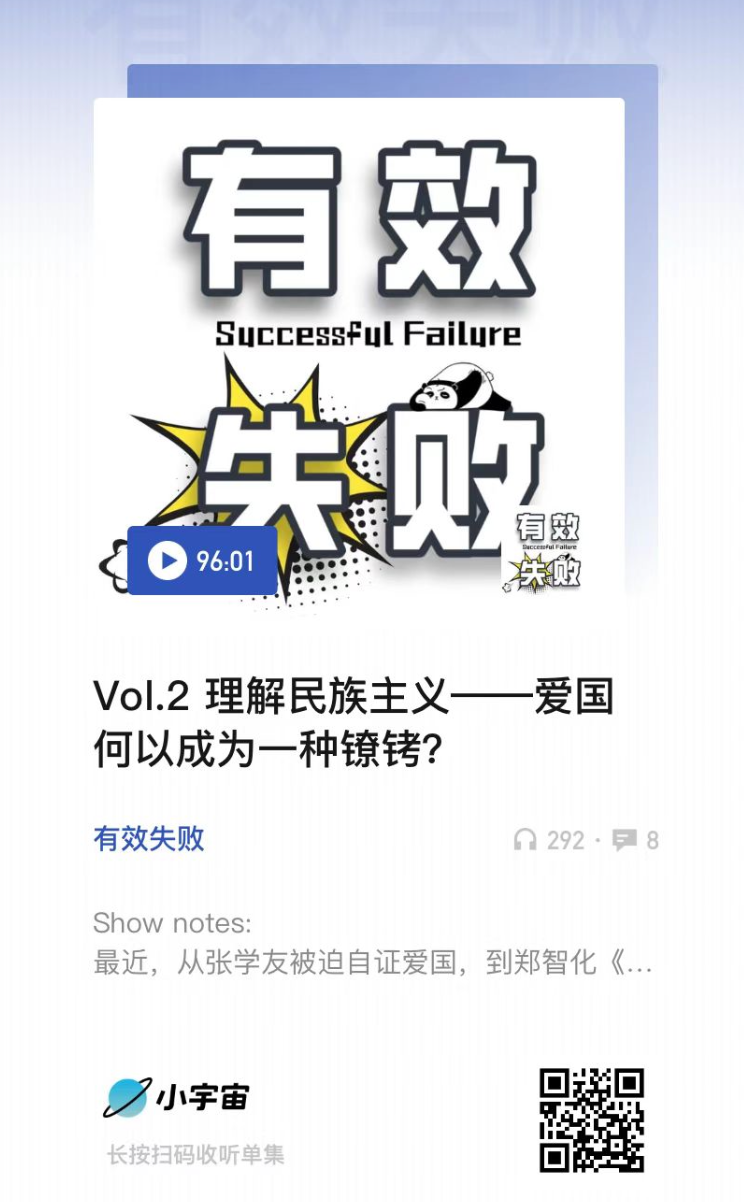
Search for "valid fail" to subscribe
Vol.2 Understanding Nationalism - How Does Patriotism Become a Shackle?
Click above 👆 to listen directly
foreword
Ge Xu has always been a friend I admire very much. I think he has some say in discussing a lot of topics such as ethnicity, history, and political philosophy.
He once wrote an article - "The Great Ideal of a Generation of Madmen", which explained his rich life experience and career. You will see how he has changed from a businessman to a dissemination of liberal arts and popularization of humanities. The teacher experience in civic education.
Learned, interrogated, pondered, discerned, and acted with sincerity. The education he did is what education should look like in my heart. We also hope to spread the fire of humanity in this increasingly chaotic land, enlightenment. The human mind, and that's what the "Effective Failure" podcast is all about.
Miso:
Today, let's talk about Jacky Cheung being forced to prove his patriotism, because many celebrities have recently celebrated the 25th anniversary of Hong Kong's return. When they sent their blessings, they not only said cheer for Hong Kong, congratulations to Hong Kong, but also added a sentence of cheer for the motherland. As a result, if Jacky Cheung did not say this, the farce was staged.
Jacky Cheung issued a statement on the same day, he said: "I am a Chinese who loves the country and Hong Kong very much. As an artist, it is my basic principle not to involve politics...
I've heard 'Come on Beijing', 'Come on Wuhan', 'Come on Shanghai'... but 'Come on Hong Kong' has been used by some people who have made mistakes, and 'black' and 'yellow' are worn by some people who have committed crimes with ulterior motives However, it has become the standard of patriotism and non-patriotism, and it has become a 'forbidden language' and 'forbidden color', which I personally cannot understand. "
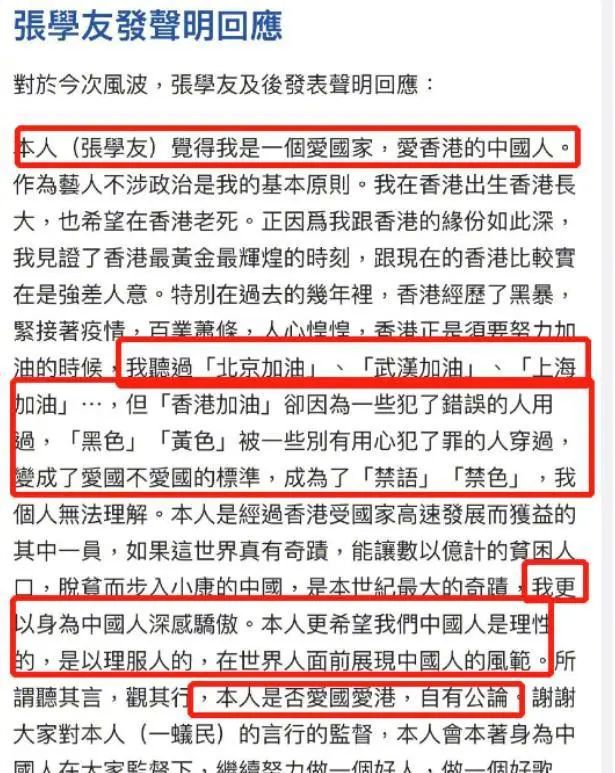
I have seen some comments here. They think that Jacky Cheung is not wronged at all when he is scolded, because he knows that Hong Kong's refueling sentence will cause controversy. It has been used by Hong Kong independence activists, and he still uses it. Now that he knows the problem himself, it's time for people to take back cheap sympathy.
Another thing is that my sister who rides the wind and waves, in order to promote positive energy, the lyrics of "The Stars Lighting" were changed from "The sky is now a dirty sky, and the stars can no longer be seen in the civilized sky" to " The sky is now, it's a clear sky... always visible."

Positive energy seems to have become the main theme of the moment, but if there are some behaviors with some negative energy, you will be attacked and abused on the Internet. Then I am also curious how you would treat these behaviors?
Ge Xu: Can we start scolding now?
Miso: You are welcome to scold.
Ge Xu: Let's start with the most emotional part. For example, I can make up a defense for Jacky Cheung. Miso, what was your first reaction when you heard this?
Miso:
Let me first restore Jacky Cheung's original words - "Hong Kong has experienced a lot in the past 25 years, ups and downs, ups and downs, but because I grew up with this city, I was born here, grew up here, I still believe This city, I still hope that this city will become a better city than before, come on, Hong Kong!" It's outrageous to be scolded by everyone for such a simple sentence, isn't it?
The following diss his people wrote "the whole process did not say the words of the motherland and China" . Another commented: "God of song, if you say that, you will lose. Hong Kong belongs to the motherland, or the motherland belongs to Hong Kong?"
I watched his video at the time, and I didn't think there was any problem at all. But after you pull out the comments below, you will find that public opinion has been blown up by these comments. Because someone commented "You didn't mention the motherland, you didn't mention China!"
Ge Xu:
When I was talking about you just now, I looked at it, and some of the things I posted on various social media today did not actually mention the motherland. For example, I made a plate of scrambled eggs with tomatoes today, but I didn't mention my motherland. Now I am very panicked, and I am afraid that everyone will come and say that you actually mentioned scrambled eggs with tomatoes, but not the motherland. That is tomato scrambled eggs belong to the motherland, or the motherland belongs to tomato scrambled eggs?
Do you know that there was a time in Chinese history when you had to mention the motherland or the great leader of the motherland when you said anything? At that time you have to say long live to who and so before you can ask if you have eaten today? This scene just now took place, and it directly caused me to fall into a kind of panic, because history has repeated itself, to a certain extent, or at least it is sliding towards that era.
In my understanding it is normal for a person to be blamed for what he said. But I have searched the history of human civilization, and I have never seen a person who was accused of not saying anything.
You are being blamed for what you said, both in the history of human civilization and in the history of human barbarism. But I was criticized for not saying anything. It only happened in the history of human barbarism. I have never seen such a thing in the history of human civilization, because what I said is someone's own freedom.
Of course, we still have to analyze the reasons behind this blog. The purpose of recording this show today is to talk about one of my old professions - nationalism , a word that touches the hearts of the Chinese people very much. I will try to give you a witty and humorous talk about what nationalism is.
Miso:
To be honest, I have recently seen a lot of new terms that I have never encountered before, like online nationalism, street nationalism. Another word is populism, which is strongly associated with nationalism, so I especially want the captain to explain to us the difference between the two.
Ge Xu:
Okay, let’s talk about nationalism first. Nationalism is something that has not been clearly defined by the academic community for the time being. But we have a simple way to define it, that is, you have to answer these two questions:
The first question is: What is the most natural and taken-for-granted classification method for humans?
If human beings are classified, socialism is divided according to the ownership of means of production, that is, whether you have assets, and how much you have.
If you have nothing, you are called the proletariat. If you have something, you have the proletariat. If you have property, what property do you have? If you have real estate, you are called a landlord, if you have cash assets, you are called a capitalist, and if you have means of production, such as factories, you are an entrepreneur. In short, these people are the so-called bourgeoisie. If you just own a house, you're petty bourgeoisie, right?
So socialism is all human beings regardless of race or nationality, it is only divided according to the ownership of means of production, a bit like whether you are below the waist or above the waist.
Liberalism, it doesn't classify people according to what, it is to classify people according to an individual, what kind of person you are, what kind of person you are, at most I will tell you to divide according to your interests, or according to your of common interests.
For example, there was a time when corporatism was practiced in Italy, and the country was divided into 13 types of people and 13 corporations. You belonged to the watch guild, and he belonged to the doctors guild.
But the method of dividing nationalism is very simple and crude, according to the nationality. This is also one of the biggest "bugs" of nationalism, that is, how do you divide the nation? But let's leave it out, because such a definition would be troublesome. Some are divided by appearance, some by language, some by common historical memory, and some by how many news broadcasts have come and gone.
Miso: Hahaha, that's amazing.
Ge Xu:
The second question is, what is the most reasonable and legal boundary of each political unit, that is, each country or each government?
The early classic red countries belonged to the socialist group. It may be said that since human beings are determined by the ownership of the means of production, then the state is determined by this class. Some countries are the countries of the property owners, and some are the decaying and declining capitalist countries, right?
In terms of liberalism, it does not divide human beings particularly thoroughly, so when they divide political units, they are based on this group of people. Does it have a common constitution that can guarantee freedom?
If there is a law that covers areas and groups of people that are recognized by this group of people and protects the rights and interests of a few people, we will regard this as a political unit.
For example, California is a political unit, and Texas is a political unit. Putting them together into a federal is another political unit: the federal government.
Nationalism is equally simple and crude on this issue. The most reasonable and legal boundary of each political unit is the nation. It is more easily accepted by the public than any other political ideology.
To understand socialism, you have to go to nine years of compulsory education; to understand liberalism, you must at least have a bachelor's degree, and to understand nationalism, you can understand it after going to kindergarten. This is the most natural division of a group of people.
So the two basic assumptions of nationalism are:
First, the most natural and taken-for-granted classification of human beings is the nation, and no controversy is allowed.
If you divide it according to other methods, either you have ulterior motives, or you have ulterior motives, or how much money your father gave you, etc., this hat can be deducted.
Second, the most reasonable and legal boundary of each political unit is the ethnic group, which is usually arrogant and does not accept refutation.
Let’s move on to the next question, what is populism?
Populism is actually somewhat similar to classical forms of democracy, but it is not exactly the same, because they are only the same in name, that is, representing the voice of the majority, that is, the majority can control all the rights of the minority.
Classical forms of democracy, such as the democracy that killed Socrates, were the democracy of ancient Greece. The most different thing from modern democracy is that the democracy of ancient Greece did not protect the rights and interests of minorities. The majority completely controls the minority.
For example, nowadays, if you are a minority, your thoughts, speech, life, and property are inviolable (others may not be controlled by the minority. For example, the division of school districts and the like is completely controlled by the majority. controlled). But even if 10,000 people ask you to die, as long as the judicial process doesn't say so, you can't die, right? This is protected.
Populism fights in the name of democracy, but when it is manifested, it often fails to reach the democratic majority. Populism is more of a person who claims to represent the majority. Note that the point here is that he must make everyone think that this person's voice represents the majority of people.
Whether it is the barbaric ancient Greek democracy or the modern democracy. They are at least a real minority majority, but populism is only a nominal minority majority, and he says that the majority is often not the true majority.
Let me give an example. For example, we have a WeChat group with 500 people. You can go in and swipe up 500 records. You can count how many people said these 500 sentences. I believe it is ten people. about.
But you will feel that these ten people represent the basic temperament of this group. These ten people, their usual language habits, how long they can type a sentence, how many lines they can type, and the gold content of their speech, basically represent everyone in this group. This is a manifestation of populism.
If these 10 people say that I represent the voice of the majority of the group members and make a decision, ××× withdraws from the group. So many people have asked you to quit the group, you have to quit the group. For example, these 10 people attacked 1 person online, and then 489 people were watching. From the perspective of populism, 489 people are not the majority, but the 10 people are the majority. So populism and nationalism are really natural partners.
If you count the people who attacked Jacky Cheung under his Weibo account, even if there are 10,000 people. In terms of the total number of Jacky Cheung's fans, it is still a negligible number. But how do people feel? These people are the majority. For example, we read this Weibo, did you make any comments after reading it?
Miso: No.
Ge Xu: Hey, neither did I. People like us are the silent majority. But the feeling is, what happened to Weibo? Why does the whole of China feel like it is falling?
In addition, I actually want to ask Miso, have you ever painted a pie for others? For example, you have to do one thing and then cooperate with several people.
Misuo: Yes, then you must give others confidence, and where does the confidence come from? Pies!
Ge Xu: Haha, how do you usually draw?
Miso: Although we haven't done this thing now, we can first imagine how high we will reach in a year or two, and how we can realize this beautiful vision as long as we dismantle it.
Ge Xu: Yes, this is a common way to describe the future. In fact, you have already stated the essence of various ideologies. All "isms" conform to three characteristics:
1. How bad is the status quo?
2. Where is the cake I drew?
3. How do we get that pie step by step from the status quo where there is no bread to eat
That nationalism, if it fits the characteristics of political ideology. First of all, the first problem must be solved, where is the current situation? This time there was a bug. Are we talking about current nationalism, or the earliest nationalism?
Because when we are listening to history, national justice and national independence are very exciting and praiseworthy. But when you talk about nationalism now, it seems like a derogatory term. There is such a disconnect between history and reality.
So let me talk about nationalism first. When was it in the earliest version, the version that is still considered very powerful and progressive?
A well-defined Nationalism appeared in France before the French Revolution in 1789, under the reign of King Louis XVI of France.
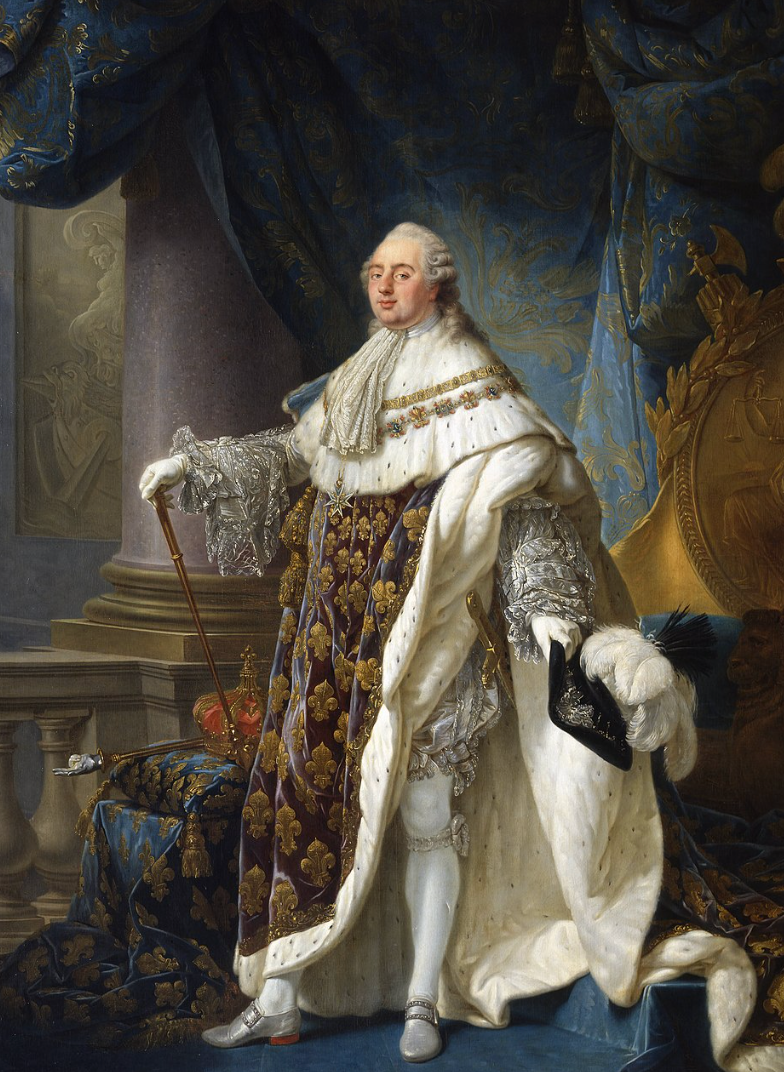
The first question, how bad was the status quo at that time? The nationalists at the time replied that the worst of the current situation is that France is the France of the Popon family, the France of the king, let’s expand it a little more, it is the France of the first and second tiers of the three-tier conference, and it is the France of the king and his Those corrupt Catholic lackeys, those French royal palace nobles, have nothing to do with our peasants and workers.
The second question, I will draw you a cake, what's so good about my cake? I'm going to take you to a whole new world - France is the France of all the French, don't ask who the French are, just understand it for the time being. If you consider yourself French, France is your France.
The third question, is this cake any good? Very good, so how can we get there? Is it good to have a revolution? it is good! A revolution is a great revolution, killing the royalists, killing Louis XVI, killing his lackeys, and dividing his land.
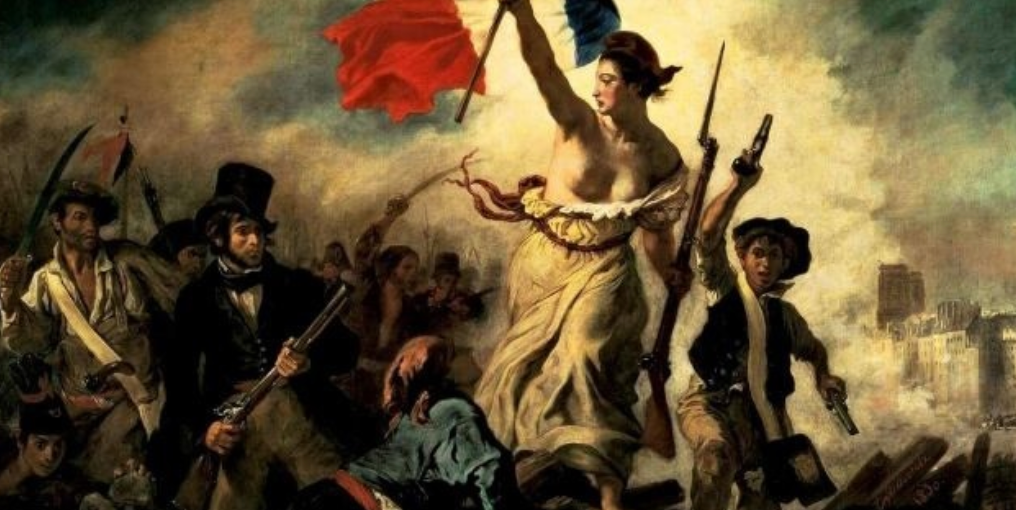
If things don't get better after killing the royalists, then we'll go ahead and kill everyone who opposes killing the royalists. If it still doesn't work, kill the next opponents, kill everyone who opposes killing all opponents, kill everyone who opposes killing all opponents... Yes, it's the infinite nesting doll, you Keep killing until this cake looks almost as promised. This was a particularly controversial point of the French Revolution that year.
But it's not just killing people, in fact, they also have an external behavior, that is, after you finish making this cake, it will be different from the actual idea. why? When you kill Louis XVI, the relatives of Louis XVI quit because you are setting an example for the whole of Europe.
For example, you are French, and I am a prince and aristocrat in Germany. I am especially afraid of the German people, just like parents are especially afraid of their children's bad learning, right? If your kid goes out to play with other people and a wild kid says I can eat ice cream every night at 11pm, what if my kid learns to come back and say I want to eat ice cream at night too?
So they are particularly afraid, is it our peasants who one day say that Germany or Prussia or Austria is the country of all of us, not the country of your Holy Roman Emperor. Therefore, many of the Bourbon royal family, relatives of Louis XVI, and these members of the European royal families are very panicked, and they are going to beat France.
It is conceivable that you were clamoring to say that I am a nationalist, we are the masters of France, and we are fighting against the French royal family. All of a sudden you gave me a better reason, and the foreigners came over. Therefore, the entire French nation was rapidly formed under external pressure, and the concept of nationalism spread rapidly.
As you may know, Napoleon was elected, and his election is completely different from the election of Louis XVI, because Napoleon's banner is no longer to say that I am a noble and a Catholic emperor, And it became that I was crowned because I am the emperor of the French, I am the emperor of your people, and I want to beat those princes and nobles on behalf of your people
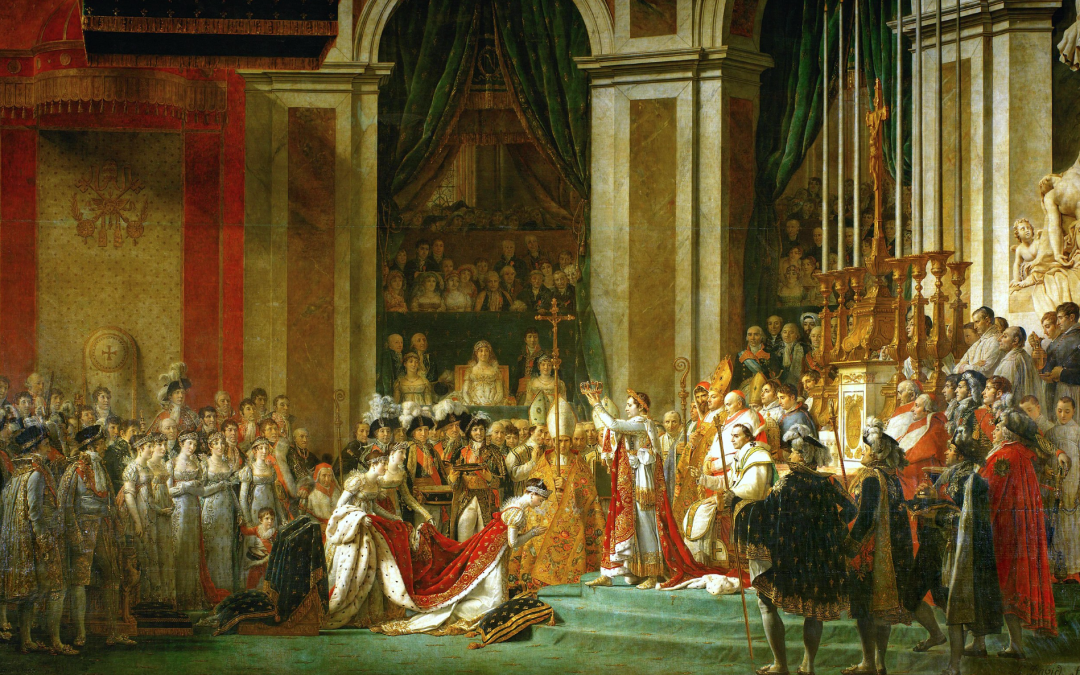
So Napoleon's iron hoof is not called to invade your Germany, I am here to wake up your nation, we French can wake up, and you German peasants can wake up too. People essentially hate him and appreciate him at the same time for this war.
On the one hand, you killed my husband and my kids by fighting this war, and on the other hand people feel grateful because it's kind of anti-imperialist and anti-feudal.
This imperialist invasion, the French imperialist forces and the feudal forces, both of them were killed. When later generations commented on the Napoleonic Wars, they said that nationalism spread from such a sporadic spark in France through the war all at once.
And the countries that Napoleon beat are basically old colonial empires. Then the suzerain of this colonial empire was killed, for example, Spain was killed, then the whole Latin America was curious: Hey, our boss was killed! what happened? In this way, when everyone explored why, they learned a new word - nationalism.
This bunch of native white people in various colonies thought, this thing is easy to use, then let's be independent, and everyone can be the Napoleon of Glass Via. The whole trend swept away like this.
Back to the topic just now, let's take a look at nationalism at the time. Why is it a good thing? This is because, at that time, the enemy of nationalism was feudalism.
About who France is,
The answer of feudalism is: France is the France of the palace nobles .
The nationalist answer is: France is the France of the French.
You don't care whether he can finally realize the France of the French, this slogan is definitely progress.
Another question is, if something goes wrong in France, who is to blame? Who is in charge?
The answer to feudalism is that the problems in France have nothing to do with you, it is not your France, what does it have to do with you? It's like I sold a house in the suburbs of Paris. How can this rise to humiliation and humiliation? It's none of your business if I sell our own land?
Is Alsatian Lorraine not the Lorraine of Alsace? That is the territory of the local lord, it is our house, whether I choose to serve the Prussians, the Duke of Saxony, or the king of Burgundy or the king of France, that is their own business, right?
But the nationalists think - France's problems are all of us to blame, and who in particular? The one we all elected. You can understand that if the consumer suffers, your CEO has to come out and apologize.
But why is nationalism now a derogatory term?
It's because after more than 200 years, its former imaginary enemy no longer exists. The current trend of nationalism is considered to be a resurgence, conservative and backward. In the past two hundred years, the idea of nationalism has not undergone any evolution. It has been standing still. What do you see as its imaginary enemy?
For example, in contrast to cosmopolitanism, I am a citizen of the world. What do I do with my private property, which country's music do I like, whether I speak French, English or German in this country has nothing to do with anyone.
But nationalism will come out at this time and say: no, you are French, you are French first, you must speak French, you are in this place, although the private property is yours, but you still have to speak at home French, you can't speak German, you can't speak English.
Obviously in our intuition this is no longer progressive. This is like when you were a very powerful person when you made a big havoc in the Tiangong 500 years ago. But you are at the bottom of Wuzhi Mountain, you have been under pressure for five hundred years, and now a monster can beat you, right? Five hundred years have been turned upside down.
To put it bluntly, nationalism was originally anti-privilege, right? Are there any privileges now? Yes! But is nationalism still anti-privilege now?
MISSO (a jolt picks up immediately): It's advocating!
Ge Xu: Yes, he is not anti-privilege, he is supporting it. Who is he against? He is against the anti-privilege gang.
Another example is republicanism , which uses "I" as a "group", which is far more advanced than nationalism. As far as "republic" is concerned, the word republic derives its etymology from a Latin word, Res publica, which means public things.
Therefore, the essence of republican thought is that none of the affairs of the state are official affairs. All things, as long as the state is involved, are public affairs. This idea was established in Roman times, and for more than two thousand years, this spirit has been passed down.
Republicanism, it is now a relatively advanced idea. The country does not belong to a certain leader, it does not belong to a certain thought. The country belongs to all of us who participate in discussions and care about our common interests.
So all things need to be discussed and discussed with everyone. What does the negotiation include? Emotionally stable discussions and emotionally excited discussions. In human words, an emotional discussion is a scolding, and a slightly less excited discussion is a criticism.
If I elect a current political official to act on my behalf to handle the affairs of this country, and you fail to do well, what should I do? I must criticize you, right? Then if I criticize you, what role does he play as a nationalist at this time?
What a nationalist is playing is, you hand a knife to a foreign country, how much does your beautiful father give you? The motherland is still improving and getting better every day, please give it a little time. In fact, I really want to say to this kind of person,
By criticizing it, you are giving it time and saving it time. I'm wrong for my motherland, isn't it time saving? Do you know what it means not to give you time? It's not giving you time to rise up. Whenever I scold you, I am giving you time and saving you time.
Since when did everyone start being scolded? For example, if you bully me online, I face the bullying calmly, and I can bully you online, that's your freedom. You are willing to scold me, no matter how angry you are, I can bear it, and I will block you if it’s a big deal.
But why do you feel like I'm interfering with you when I scold you when the subject changes? Indeed, nationalist rhetoric is full of this ubiquitous double standard.
You can understand it this way, any ideology is actually a tool. 200 years ago, the most outstanding and most worry-conscious social elites of that era developed such a tool, which created the subsequent French Revolution and created the subsequent revolutionary achievements.
Including China in the early 20th century, the nationalism in the hands of those intellectuals was a feeling of worrying about the country. Lu Xun is one of them. All he aimed at was public power.
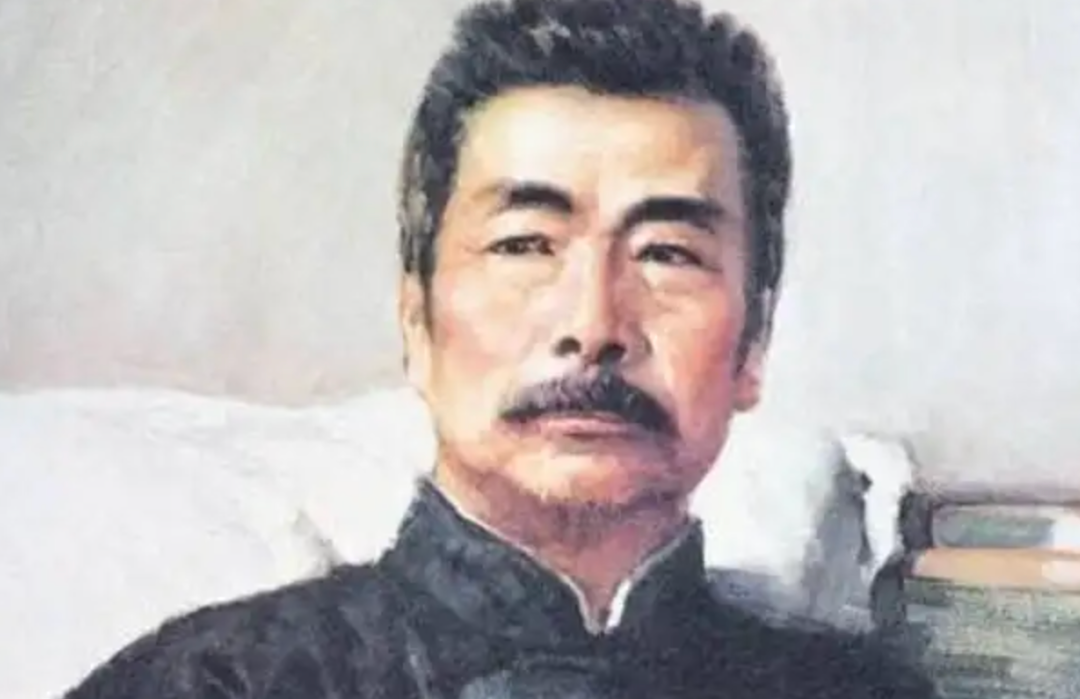
He will never use this tool to entrap those wise people who are worried about this country. If you scolded the Beiyang government at that time, Lu Xun would not use the banner of nationalism to say that you are handing a knife to Duan Qirui, and you are handing a knife to Zhang Zuolin. He never said that, nationalists would be hurt at that time. scolding Beiyang warlords.
But as the country is established, the tool of nationalism becomes obsolete, because it is only used as wasteland in the early days. Later, you need better things, such as constitutionalism, cosmopolitanism, and macro-control Keynesianism. Those who still want to pick up the broken knife of nationalism at this time are most likely uneducated people.
Misuo: We just mentioned that Lu Xun. I seem to have seen it on Twitter before. If Lu Xun was alive now, many of his words would definitely be whipped to corpse.
Ge Xu: Yes, you put his words on Weibo as is, and only hide the author's name "Lu Xun", and then you can see the reactions of netizens.
Miso: I don't know if it's true or not, but the current educational textbook seems to have deleted many of Lu Xun's articles. What do you think is the intention of deleting Lu Xun's article? Is it inappropriate, or what?
Ge Xu: I suddenly remembered an excerpt from Animal Farm. This is a dystopian novel by George Orwell, very famous.
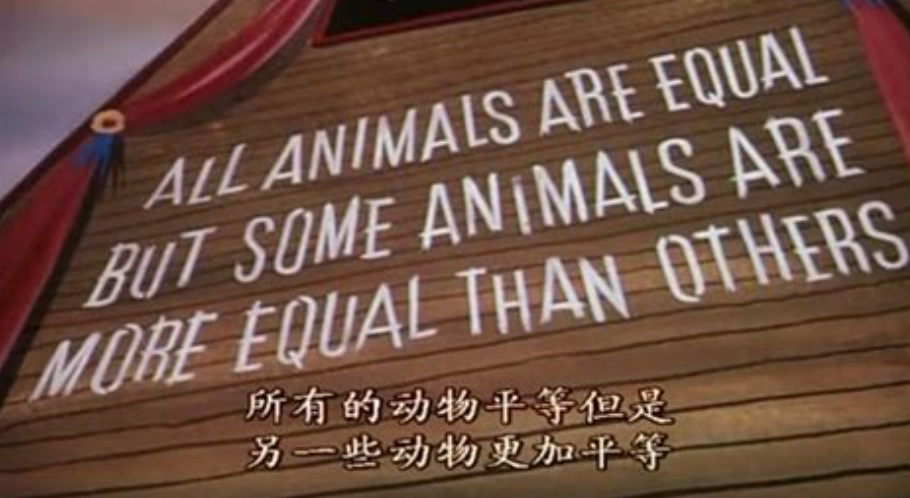
Miso: I'll read it aloud to everyone.
He announced that, by a special order of Comrade Napoleon, the "Beast of England" had been abolished. It is forbidden to sing this song from now on.
The animals were stunned.
"Why?" Muriel muttered.
"No need, comrades," said Squealer coldly, and the Beast of England was a song for an uprising. But the uprising has succeeded, and this afternoon's execution of the traitor is the final act.
What we expressed in "Beast of England" was the desire for a better society in the future, but that society is now established.
Ge Xu: This is the best answer to your question just now.
In other words, whether you insist on a better society depends on whether you are the master of the current society. If you are, sorry, there is no better than me, I am the best. You said there could be better, so what are your intentions? Are you saying I'm not good?
So whether this society is good or not depends entirely on where my coordinates are? Where I am is the top of the universe.
Next, we can talk about it again, what exactly is Internet nationalism?
In fact, the earliest nationalist thought, especially the era when it began to erupt, was after the 15th century, that is, around the time of the fall of Constantinople. One thing that was particularly interesting at that time was the emergence of print capitalism .
You may have heard of Gutenberg movable type printing. We also have a project called Gutenberg project. We all mention Gutenberg when it comes to books, because he came up with the first movable type printing around 1450. machine.

Movable type printing was actually stranded in China until the late Jin Dynasty. Woodblock printing is still the mainstream, just because Chinese movable type printing is really a bit uneconomical and unrealistic. There are too many Chinese characters, it's not like 26 letters.
Then movable type printing made it impossible for a thing to be passed on by word of mouth. Word of mouth is easy to spread the truth, and people will not understand it. And manuscripts are too expensive. So for example, in this German region, at the beginning of the 16th century, the literacy rate was only about 4%, and this 4% refers to the literacy rate of German dialects is 4%. People who can understand Latin are even more rare. After the advent of movable type printing, the cost was greatly reduced.
And especially interesting, why is it called print capitalism? These printers, represented by Gutenberg at the time, didn't care what they printed. Whoever gives more money, I will print whatever, they are for the money.
Prints in Latin are a luxury, and they don't make much money. For example, the Pope, right? You print an exquisite Bible. After you print it, people will not change the Pope for decades. Once you print it for 50 or 100 years, your business will soon be gone. .
But what is more printed? Pulp fiction, pornographic jokes, political propaganda, discounts, there are so many of these things printed, not in Latin, but in French, in German. It makes the process of civilization promoted by a group of self-interested merchants when the printing technology first came out.
Therefore , nationalism actually began to brew after the development of printing, and it was dormant for a period of time. That is to say, people don't wake up suddenly after hearing "France is France for the French". In fact, the foundation was laid before the French Revolution, and then someone finally broke the window paper.
Before this, everyone already felt that your Bourbons were a bit too much. People have had this concept since the beginning, including China. There was a saying in those days that "people who are not our race will have different hearts."
Internet nationalism is the same. Those who were the first to master reading and writing were the main propagators of nationalist ideas. The current Internet nationalism is that the group of people who play the most online or have the most sense of belonging to the Internet are the main targets of Internet nationalism. In this case, we raise another topic, which is the idolization of the country.
Misuo: You remind me of "Brother Ah Zhong" .
Ge Xu: Yes, it's brother Ah Zhong. Because a lot of people don't live well in real life. The more people who live smoothly in real life, the more they are not interested in the expression of brother Ah Zhong.
If you are a citizen of the world, your friends are all over the world, and you can speak a few languages yourself, in the process of getting along with friends from all over the world, if you do not pay attention, you will not realize what kind of language the other side is using Language, it is natural to switch over.
You don't care about his race either, they are all your friends. It's the same when doing business, whether you're on the web 3 or wherever, you've come together for a common social consensus.
I won't say, Fan Miso, you show me if you still have a passport of the People's Republic of China, and then I decide to do this "effective failure" with you. If you don't have this passport, your whole person is invalid.
To me, you're Fan Miso, you're an interesting person, and that's enough. I don't need to check whether you have a passport, or what to do with three generations of political review, it doesn't matter. Even if you are an artificial intelligence, I don't really care.
But if you can't find such a fulfilling thing in your life, a like-minded person, you will easily resort to an idol. What if there is no idol? Then make one. So brother Ah Zhong is basically no different from the rice circle.
If these people are really patriotic, I will ask them the simplest question, what is the conclusion of the Xia, Shang, and Zhou dynasties projects? He couldn't answer. With a load of questions like this, I guarantee he will fail.
So he doesn't really care what the country is like, just saying that this thing can be put on me. The phrase "do not accept refutation" is clearly not out of national pride, he is a hedgehog's protective layer. He wants to express himself in this way.
This phenomenon does not only exist in the current 21st century, it is actually the romanticism of the 19th century, which is essentially a reaction to the Enlightenment. You Enlightenment thinkers talk about human rationality every day, and you talk to me about arguments, arguments, and arguments every day. I do not! I want to show my personality! I'm going against rationality! I've read so many books, I know what reason is, but I don't, I just want to say that Germany is great, we grew up listening to the Nibelungsong, this generation Herder and Fichte said is right.
Don't tell me your truth, I don't listen I don't listen.
Romanticism is characterized by a group of irrational literate people. It is not that he does not have the ability to think rationally, but that he is tired of it. So you see, this explains why many college students, those who have studied for so many years, will show a tendency to be anti-intellectual.
Instead, it's not because he doesn't know how, but because he's tired, he listens to too much of his father's taste, he can't find a job, and then he is disciplined by his boss every day and urged to marry by his parents, and he has no sense of control over life.
So from this perspective, nationalism has become a cool thing with its simplicity, passion and self-expression. At least when I was a little pink, I thought it was a very cool thing. cool thing.
Just like a lot of people have the head of Che Guevara printed on their bodies. But none of them knew that Che Guevara was Argentine, that he died in Bolivia. He didn't know any of this, but he knew that there was a guy who was so handsome. There is a five-pointed star on the hat. I asked a child at that time, and I said your profile picture is very cool. He said yes, my idol is Castro.
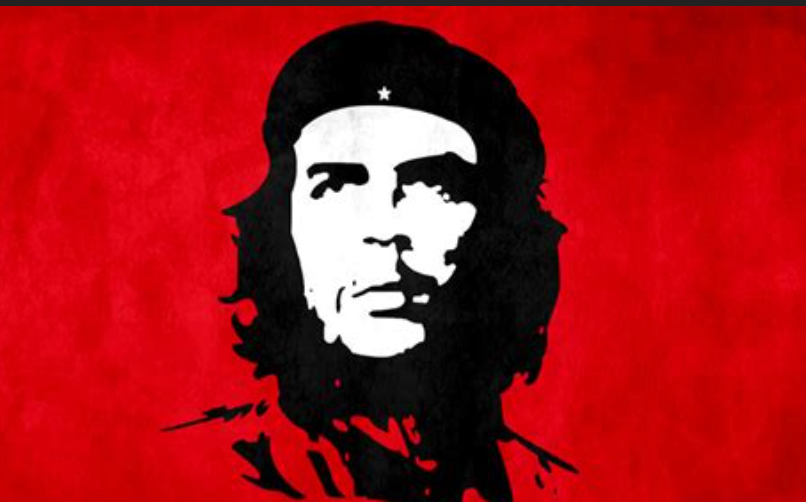
Miso: I don’t know if it’s because of the epidemic. When the economy is not very good, identity recognition is particularly easy to magnify. In such a big environment, people seem to be extra cautious when speaking online for the so-called self-protection.
For example, on Douyin, there is a travel blogger CP, the first message in her message is her official response to the question about the Taiwanese accent: "I want to explain that Xiaolin's dialect is Hokkien, and Xiaolin in the Hokkien speaking area. Friends may be able to hear it all at once. There are indeed some accents when speaking, which is similar to the so-called Taiwanese accent, but there are also some differences, please bear with me.”
The following sentence with a high number of likes is: "Three sentences never leave my husband, and ten sentences never leave English." The blogger replied: "This is a bad habit developed in the work relationship. If it offends everyone, please bear with me. "
You will find that everyone's political sensitivity seems to be very high now, and the desire to survive is also on the rise.
If you talk in Chinese and English unconsciously on some social platforms, it means that I think a certain English word is very appropriate, it is more suitable than Chinese, so I use it subconsciously. Then the comment area will say: You can't speak Chinese or what? Why use English words? Is Chinese not good enough?
Ge Xu:
I often encounter. And my solution is, first, I will try to avoid speaking English alone, I try to speak English in whole sentence.
Second, I might replace the English words with Spanish or Latin, which he doesn't understand. Because he couldn't understand the language, he struggled to leave a message. Tried to find out which language this is, but it's too much trouble. Then I felt too tired, so I switched to another house. Change to another language that is hard to detect, say you learn something like Slovak.
I read an article this morning, and there is a very novel point of view, which attracted me all of a sudden, it said - China has not completed the founding of the country.
What are we talking about when we say "country"? It actually has three correspondences, three words from English or Latin - nation, state and country.
Country evolved from the Latin contrata, which is a bit like what we call the suburbs, corresponding to the concept of "city", which was later extended to a concept in the geographical sense. When we say This is my country, we actually mean This is my land. This is the land where I was born and raised. This is the West Lake. This is the Liaohe River. This is my country.
State actually evolved from this Status Res publica, that is, from the "Republic". It refers to public affairs of the moment. The state is more of a political concept, which is translated into states in the United States.
The etymology of Nation is natio, which means birth, as well as the meaning of tribe, that is, it will be connected with relatively imaginary things such as tribal culture, etc. It is difficult for you to grasp its physical form. For example, our common memory, common cultural habits, if I say a pun, can you hear it? You're talking shit, can I laugh? Nation refers more to a country in a cultural sense.
The so-called China has not completed the founding of the country, which means that although China has long been established in the political and geographical sense, whether it is through the change of dynasties or the victory of the revolution in 1949, but culturally China is actually not. country built. This is a bit strange, because the countries in the first wave of nationalist movements were culturally first to complete statehood.
What does it mean to complete the founding of the country first culturally? Americans, for example, they know what's the difference between me and those Brits? They know what kind of new ideals and hopes they have cultivated in this land. Under the Constitution, the rights of a few of us can be protected, and we will never have another king here.
The Declaration of Independence does not represent political rules and regulations. It represents a unique culture, a social consensus, unique to this place. The words he said, the things he agreed with, were America. The same is true for France, the United Kingdom, and Rome. For example, some of their basic principles are owner, compromise, nobility, and so on.
China once had it, but looking at China today, unfortunately, many intellectuals of our generation and the backbone of the nation have been slaughtered for various historical reasons.
This makes it impossible for our country to have too many choices in culture. How do you say I define I am a Chinese? If you think about those overseas Chinese, these people make dumplings during the Spring Festival, we can see that many domestic compatriots have been moved to tears, saying that they will never forget their roots. But when people speak English, you immediately collapse.
You will find that in the US, the prevailing opinion is that you can speak the language you like, you may be a Hispanic, but as long as you identify with the spirit of the United States, it doesn't matter what language you speak. In other words, people don't need to speak a certain language, or look like, or listen to a certain kind of music, or how big is my country? Has the neighboring country come over? Have you surrendered to me? It doesn't matter if you have a primary and secondary name, and you call it Dad. It's enough if you can identify with a certain unique spirit.
And this is actually the point that China's founding has not yet been completed. We assume that the Chinese have achieved a real state of etiquette at the cultural level, and then make this kind of benevolence, righteousness, courtesy, wisdom, trustworthiness, gentleness, respectfulness, thrift, etc. into the world business card of the Chinese nation (but this is actually a bit difficult, because these virtues It is a universal value common to almost every nation. It is also found in the Koran and the Bible. There are basically similar sayings in the basic education of various countries. Played the national uniqueness.
At this time, if you see another person, everyone will recognize him because of this, and even they will attribute people with similar characteristics to the Chinese. I think that at that time, everyone will no longer be so concerned about whether this person is speaking in a mixture of Chinese and English, or whether you have a Taiwanese accent when you speak.
Many people are obsessed with this accent. In Chinese society, there is a chain of contempt for such an accent. For example, in northern China, the more Beijing accent you speak, the higher your status.
Why are you so obsessed with one explicit thing? It's because your inner core is empty, and you don't have any point that can highlight Chineseness. What is unique about the Chinese? Misso, you have seen many Chinese tourists abroad, can you recognize them at a glance?
Miso: Then I will share two things, one is the language issue we mentioned just now. Canada is a country with English as its official language, but Montreal, Canada is a French-speaking area, their local first language is French, and the local government will give you money to take French classes for free.
In China, the whole country speaks Chinese, but the people of Zhejiang do not. Its first official language is English, so everyone's reaction must be what do you want to do? Do you want to be independent? Or how? And you look like Canada has no problem with this.
The second point is about the Asians I see outside. I remember when I was in Peru, there were a lot of Japanese there, because the core immigration places for the Japanese were Brazil, Peru and the like.
I often meet Japanese people there in restaurants or other places. Same Asian face, but you can tell at a glance that she is not Chinese. One is that their external dress, dress, etc., will have obvious Japanese characteristics. Second, and more importantly, behavior. Especially when I'm in the restaurant, I can clearly feel that Japanese people are very elegant in their manners. But Chinese people often have a relatively large contrast, with relatively loud voices and relatively loud movements.
Another thing I am particularly impressed with is that I have never been regarded as Chinese by foreigners outside. I don’t know why, this is a very strange thing, and I am also reflecting on myself, whether I am not Chinese, or am I unable to On behalf of the Chinese, I sometimes feel a little bit angry.
Ge Xu: You cannot conform to the stereotypes the Chinese have left on the world.
Miso:
Yes, their subconscious reaction is that you are either Japanese or Korean, anyway, the first one will not guess Chinese. But when I say I'm Chinese, they're mostly friendly too: "Wow, China is great". Then I thought to myself: Then why didn't you guess I was Chinese in the first place?
There is another small point that I can give you. At that time, I said to my friend, "Did you have a feeling when you came to Japan that you really don't want people around you to recognize that you are Chinese?" Then she said, "Ah, so we feel the same way."
For Japanese, our faces are not as obvious as Westerners, and it is actually very easy for you to disguise. It's good to be fluent in Japanese, and it's good to look good.
You may be scolded to death in China, but after you arrived in that environment, several of our friends chatted about it privately. Why don't we want to be considered Chinese by the Japanese around us?
Ge Xu:
In fact, I think it's still the same sentence. It's not that you don't want to be recognized as Chinese, but that you don't want people to stick Chinese stereotypes on their heads. In fact, I am relatively immune to this, why?
The reason is that I have experienced the same thing at home. It's good that you are from Hangzhou, because the worst stereotype left by Hangzhou people is only shrewd and calculating. But other impressions are basically good, there is heaven above, Suzhou and Hangzhou below, Hangzhou beauties and so on.
But I'm from the Northeast, no matter where I go, my first reaction is, should I hide it? First of all, the accent is a hidden method. For example, I am from the southern Liaoning area. How would you react when I changed to the dialect of southern Liaoning to speak to you? Yes, you will think that I am very rude.
If you use the northern Liaoning dialect, such as the accent of Zhao Benshan, the sonorous and powerful Northeastern dialect, you will think that I am Tie Hanhan or I am a thug, or you may have such a stereotype of me: Dai Jin Blind migrants in the society who are chained, skewered, and shouted Mai are called blind liuzi for short, and there is usually an old girl who picks garlic next to them.
So when I moved blindly in China, I was already prepared for this. In what situations should I change my accent to achieve a certain purpose. Because of the stereotype of the Northeast, it is very unfavorable from a commercial point of view, and the investment in Shanhaiguan is not enough.
But the stereotype is not wrong, it just comes from reality, it is just incomplete. Generally speaking, the accuracy of your judgment based on stereotypes is relatively high. Since this place has left some kind of stereotype on people, even if it is from the past, even if you are dispelling this stereotype, it still exists.
But when we do business, everyone may be able to guard against it, hey, he is from the Northeast, will he not be trustworthy? Wouldn't it be unreliable to speak, wouldn't it be bragging too much, right? Then I might change to Beijing dialect, Mandarin or something else, at least people can't tell where I am from.
Although I might let them hear in general, this is probably someone from the north, sounds like a highly educated person, I might change the grammatical structure, say more long and difficult Chinese sentences, etc., in any case as long as I can Just push this project down, and then we will cooperate with each other, and when the cup is changed, I will tell you that I am actually from Liaoning.
At this time, everyone's impression of me is that you are a reliable person, and you will add Northeasterners later, and you feel that you have added points to the Northeast. This is how I was able to dispel the stereotype and not let the stereotype get in my way.
For the same reason, I believe that you and your friends, including me, were also trying to hide your identities from the very beginning, just because you didn’t want to let the stereotypes of China hinder me and prevent me from playing my Chinese role as a Chinese. The good side of people, I hope that after you see the good side of me, I will tell you that I am Chinese, so that this goodness can also be placed on the head of China.
Miso: Yes, you remind me of one thing, which is also very interesting.
I remember when I was in Peru, I met a group of people, including Hungarian, American, German, and Latin American people, sitting together to eat, and discussing the negative impression of people from different countries at the table.
I remember that the one they called the most at the time was the French. An American says I don't like French people first, and then the Hungarian at the next table will say, I don't like French people either.
Including I remember a German, he is also very interesting, he said I don't like French, do you know the reason? It was when he was hiking a mountain that he met a Frenchman. He greeted him face to face and said hello in English very kindly.
Ge Xu: Then the Frenchman replied bonjour.
Miso:
Yes, the Germans felt offended. I asked him, why do you feel bad when the person greets you in his own language? Then the German said very seriously, this is where I think they are not open-minded at all, it is this group of people, he only thinks French is the best language, and he only uses French to communicate with you. He thought the French were too arrogant.
Ge Xu:
Is it so difficult for you to admit that the French Empire has declined?
I happened to mention Japan just now, so I have a very interesting word, and it is also a word that made me think about it, it is called nationalism of consumerism .
Miso: Spread the word!
Ge Xu:
After Japan's defeat in the war, the group of people who held Hideki Tojo hostage from the Japanese military was killed, and the whole of Japan became refugees of freedom and democracy, but the social ideology will not disappear so quickly. That is, militarism and Japan's extreme nationalism still exist. After all, it has been since the Meiji Restoration, and it has grown stronger. It took a few generations to overthrow the Qing Kingdom and knock down the entire Pacific Ocean, right?
So these forces he is still active in this society. That includes the well-known right-wing revision of Japanese history textbooks.
What is particularly interesting is that these ultra-nationalists have no room for survival in post-war Japan. Once they had room to survive because they were the mainstream ideology of the country, that is, there was an army, an army, a navy, a samurai class, whoever disagreed with me, I would kill anyone—he kidnapped almost all the Japanese.
But in a free market, when you can't use violence, you can only compete fairly. So at this time, this group of people started to say, OK, then we will save the country.
To preserve this fervent love for the Japanese nation. What can we do? After changing the textbook, I found that no one bought it, right? then what should we do? For example, can we make beautiful kimonos? Can we make manga that highlights the Japanese spirit and wrap it in sugar-coated cannonballs. Only then can we sell at a good price in the free market. After selling at a good price, we have the energy and financial resources to further support the great cause of nationalist revival.
As a result, people can change. When they were doing this, they found that Japan's unique culture had achieved a breakthrough in aesthetics. From aesthetics to animation and comics, clothing design, and Japanese food, these people made a lot of money. Full. So they turned consumerist nationalism upside down and turned into nationalist consumerism.
That is, once they used consumption as a means and a nation as their goal. Later, they found out that it was possible to make money by doing this, so they used Japan's national uniqueness as a means and consumption as the ultimate goal to complete such a transformation.
This is the great value that nationalism can still bring to mankind in the second half of the twentieth century.
We look at those excellent comics such as "Naruto" for the blood spirit and heroic dream, "One Piece" is no less than Marvel, "Doraemon" has inspired many children's scientific dreams, right? Including Japanese sushi and the contribution of the entire Japanese food to world cuisine, as well as Japan's unique culture, their tourism, everyone has changed. In the 1960s and 1970s, the Japanese were more than Chinese aunts. That uncivilized behavior. The consumerism of Japanese nationalism is actually restricting every Japanese citizen to keep this business card for making money.
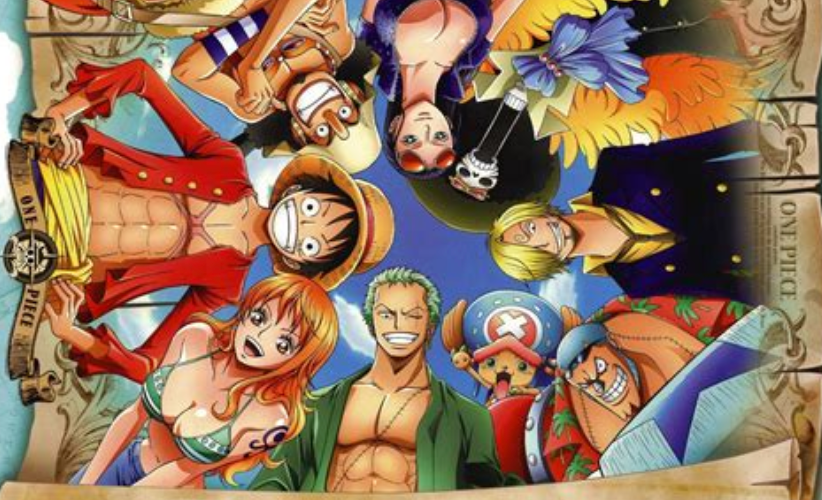
It must retain its own Japaneseness, and one that is good enough to be accepted by the global free market. This is a good example of the postwar transformation of nationalist thinking. One of the good things about this is that nationalism will no longer have a grip on political power , which means that nationalism cannot at its root have anything to do with knives and guns.
At this time, nationalism has no choice, and this kind of thinking can only be transferred to the commercial field. When a businessman competes, he always starts from the preferences of consumers. There are a lot of Chinese people who haven't changed their minds. They think that Americans don't buy our stuff because they are targeting me.
But have you ever thought that Americans don't buy your stuff, it's most likely because your stuff doesn't work well, or doesn't look good, or isn't cost-effective. So what should your thinking be? We're in business, and that's my stuff good enough. Your first reaction should not be to accuse the other side, you have ulterior motives, but you should first look at it, what is my competitor like? Is there a place where I'm not as cost-effective as they are? You, like DJI drones, sell very well. No Americans are targeting you, right?
This nationalist sentiment in China has actually transformed into this kind of consumerist nationalism in some ways. For example, the recent plain-clothes version of Hanfu that can be worn outside at ordinary times.
Miso: For example, new consumer goods such as Guochao.
Ge Xu:
Yes, but the problem is that the driving force in this area is insufficient. The reason is the nationalism of our country, which still has political power to some extent. It's a bit like a person who won't stand up if you always give him a particularly useful wheelchair. And now this nationalist trend of thought in China can be transformed into a certain kind of legitimacy, which can be provided to some people to achieve a certain political purpose.
Then there are some censorship systems on the Internet. If you say patriotic, you can get traffic and realize it. So if you have a passion for patriotism, all of a sudden you realize that I just need to show that passion, and this unfair competition can get a lot of traffic. And all my dissenting voices, their podcast videos, have been censored and deleted, so I say extreme things every day.
As a result, you will find that these things he said have neither the possibility of going to sea nor a way to convert them into consumer goods. They just keep hyping themselves up in an echoing gallery without converting them into any productivity. So, this means that nationalist sentiment will become more and more radical and become a destructive force. It's like if your engine keeps going, but there is no exhaust port, it will eventually explode.
These radical nationalists generally have three characteristics that make them increasingly weak.
The first feature is hollow. What is a hollow? It is that he is less and less unique of his own. Apart from speaking Chinese, eating Chinese food, GDP, and the four great inventions, he has nothing else that he can do. What GDP first, population second. It's all fake stuff. There is not one item that he can manifest in himself, and he cannot manifest anything.
Foreigners all say you are like Japanese, you are like Korean, no one says you are like Chinese, because no one knows the common social consensus in China, what is this unique and beautiful value?
The second is cowardice. This cowardice is not a hidden cowardice, but a bravado, a cowardice with a big fanfare. As we said in our last podcast , people are brave when they are safe.
Because of what nationalism is like, there is an American comedian who said this on a talk show—
What is nationalism? Nationalism is to put on one's own glory that does not belong to oneself, and then hate those who have never met.
What they like to do, that is, whenever the Chinese people achieve something, he will post the glory, saying that this is what we Chinese did, and he feels that he has been sublimated like this. In fact, only when you have achieved nothing, will you have to worry about whether Yang Zhenning and Li Zhengdao are Chinese or Americans. There is also the controversial issue of Gu Ailing's dual nationality.
Isn't a strong person saying that this sportsmanship is great, and I hope to be the world's first in my field like her in the future.
I saw a strong man and he inspired me. It's not that I saw a strong man whose title has something to do with me. It is divided into 1.4 billion copies, and I can get one myself. Gu Ailing is Chinese and American, and has a direct relationship with me. She is everything to me. The question of her nationality is my whole problem.
Ge Xu: There is also a group of people who have never met with hatred. Look at how many people talk about nuclear peace in Tokyo every day.
Miso: Yes, there is also the Taiwan issue.
Ge Xu: Yes, Taiwan. You haven't seen him, why do you hate him?
Third, the desire to control . Only a man who has nothing can have the desire to control. A manipulative man is a man whose people are turning away from you.
If everyone is coming to you, what you should say is do n't suffer Laozi, it's too annoying, you people.
Miso: Hahaha are you talking about yourself?
Ge Xu: I'm talking about the past me, I used to be hollow and cowardly. There is no desire for control.
In the same sentence, where do you see talent and capital?
Talent always goes to the place where he is respected, and money always flows to the place where private property is protected.
Miso:
I remember that there is such a standard for judging the degree of development of a country, which is the proportion of foreign labor force. For example, in Japan, the proportion of foreign workers is very high. If you go to a 711 convenience store or something, you will find that many cashiers are not natives, but foreigners. Vietnamese, Chinese, Indians, Sri Lankans and so on.
Ge Xu:
If you say that, someone will jump out and scold you. They will say that our country is not a country of immigrants. But his defense justifies what we've said before. Why are we not a nation of immigrants?
The first is to be afraid of the so-called "contamination" of the bloodline, who will look like a mixture of Chinese and African blood in the future, what kind of white pigs and niggas, right?
The other is that foreign immigrants will impact our socialist values with Chinese characteristics, right? What kind of person would say that, the so-called Chineseness in him can only be expressed as a thin racial trait, and you will collapse immediately when someone hits you.
If you are really confident in your system and your values, then I don’t think a person needs to rely on their skin color and race to define whether they are Chinese or not.
Miso:
I want to say a very interesting phenomenon here, that is, have you discovered it? For example, in the matter of gender, if a woman's partner is a foreigner, the Internet will often say that this is a loss of rights and humiliation to the country, and you are a sinner through the ages. And if a man marries a foreign wife, wow, then you are honoring your ancestors and honoring your country.
Ge Xu: I have a deep understanding.
Miso: As far as these two value systems are concerned, I don't know what you think.
Ge Xu:
This is the typical objectification of women, there is nothing to whitewash. That is, you treat women as national assets. Chinese women are precious resources of the Chinese nation, just like oil cannot flow out.
So we say that this is a structural problem, that is, it is a problem in all aspects. If we really want to talk about it, there is no way to solve this problem by dismantling any one of them alone. You have to start from the whole and find the most fundamental problem in the whole that point. See which button can be pressed to change the whole board?
I dare not say what the fundamental point is, I really dare not say it, but in fact, many people know it, because this is not an innovative move, and I don’t know how many times this has happened in human history, and there have been so many successful case, right? After a little reading and brainstorming, you will know. Reading a lot is good.
Miso: If you are interested, you can continue to learn about the Global Citizenship Course of the alone reading.
Ge Xu: I have a global citizenship program, and I hope it can improve the dimension of everyone's thinking and understand how the bottom of our society operates. Of course, the master leads the door, and the practice is personal. We're just in charge of putting you on a new track and watching you on a path of knowledge.
The teacher is me, and I usually speak in this style. When lecturing, I try to maintain the attitude of a historian, but on the other hand, I will also show my personal thinking, so it is not just a popular science , it is more of a summary of what an old river and lake has seen and heard over the years.
The price of the "Global Citizenship Program" is bid by everyone
Interested friends are welcome to reply to "effective failure" in the background of the public account "Lonely Reader", and go to explore by yourself~
Like my work?
Don't forget to support or like, so I know you are with me..
Comment…